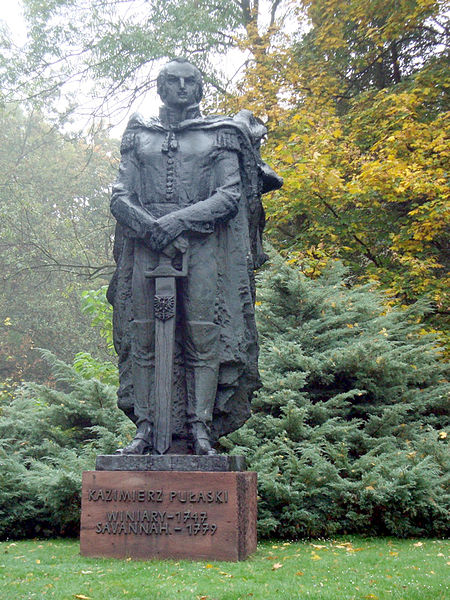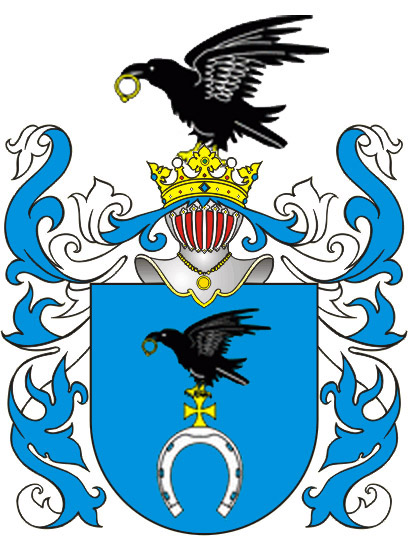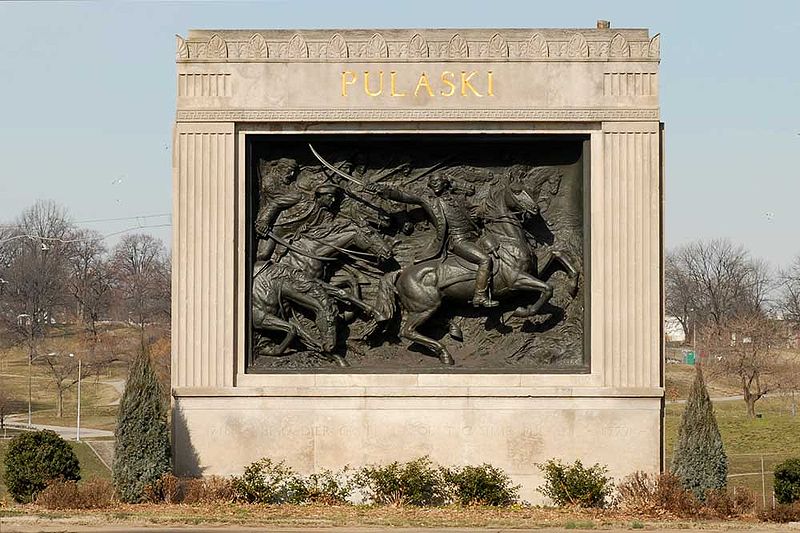<Back to Index>
- Humanist Joan Lluís Vives i March, 1493
- Poet Luigi Alamanni, 1495
- General of the Continental Army Kazimierz Pułaski, 1745
PAGE SPONSOR


Casimir Pulaski, or Kazimierz Pułaski in Polish (full name in Polish: Kazimierz Michał Wacław Wiktor Pułaski) of Ślepowron coat-of-arms (March 6, 1745 – October 11, 1779), was a Polish soldier, nobleman, and politician who has been called "the father of American cavalry".
A member of the Polish landed nobility, Pulaski was a military commander for the Bar Confederation and fought against Russian domination of the Polish – Lithuanian Commonwealth. When this uprising failed, he emigrated to North America as a soldier of fortune. During the American Revolutionary War, he saved the life of George Washington and became a general in the Continental Army. He died of wounds suffered in the Battle of Savannah. Pulaski is one of only seven people to be awarded honorary United States citizenship.
Pulaski was born on March 6, 1745 in the now nonexistent Pulaski manor house, located near the present address 53 Nowy Świat St. near Warecka St. in Warsaw, Poland. His father, Józef Pułaski, was a well known lawyer - the Advocatus at Crown Tribunal and the Starosta of Warka and one of its most notable inhabitants. Early in his youth, Casimir Pulaski studied at the local college of Theatines in Warsaw.
In 1762, he started his career as a page of Carl Christian Joseph of Saxony, Duke of Courland and a vassal of the Polish king. However, soon after his arrival at Mitau, the ducal court was expelled from the palaces by the Russian forces occupying the area. Pulaski returned to Warsaw, where he took part in the 1764 election of the new Polish monarch, Stanisław II August.
A skilled military commander and a son of one of the notable families, Pulaski became one of the co-founders of the Bar Confederation, together with his father, on February 29, 1768. The confederation, aiming to curtail Russian hegemony over the Commonwealth, was actively opposed by the Russian forces stationed in Poland. As the Marshal of Nobility of the Land of Łomża, Pulaski became one of the best commanders of the confederate forces. That year, he was besieged in a monastery in Berdyczów, which he defended for two weeks against overwhelming odds. Taken captive by the Russians, he was set free after being forced to pledge that he would not return to the confederates.
However, he did not consider such a forced pledge binding and fought against the Russian forces for four more years. In 1769, he was again besieged by numerically superior forces, this time in the old fortress of Okopy Świętej Trójcy. However, after a brave defense, he was able to break through the Russian siege and lead his men to the Ottoman Empire, from whence they returned to Lithuania. There, Pulaski incited yet another revolt against Russia, with many local nobles joining the Confederation. Between September 10, 1770, and January 9, 1771, Pulaski also commanded the Polish forces in the siege of Jasna Góra monastery, which he successfully defended.
In November 1771, he was accused of being the main organizer of an attempt to take the King of Poland hostage. However, the attempt failed, and the Confederation was disbanded soon afterward. Pulaski was made a public enemy and sentenced to death in absentia for attempted regicide. He fled the country, but no European state would accept him. After a brief stay in Turkey, he moved illegally to France, where he was recruited by Lafayette and Benjamin Franklin for service in America. Modern historians have cleared him of any participation in the attempted abduction.
Franklin
recommended that General George Washington accept Pulaski as a
volunteer in the American cavalry and said that Pulaski "was renowned
throughout Europe for the courage and bravery he displayed in defense
of his country's freedom." After
arriving in America, Pulaski wrote to Washington, "I came here, where
freedom is being defended, to serve it, and to live or die for it."
He saved the army from a surprise at Warren Tavern, near Philadelphia, took part in the Battle of Germantown, and in the winter of 1777 - 78 engaged in the operations of General Anthony Wayne, contributing to the defeat of a British division at Haddonfield, New Jersey. However, the cavalry officers could not be reconciled to the orders of a foreigner who could scarcely speak English and whose ideas of discipline and tactics differed widely from those to which they had been accustomed. In addition, there was his imperious personality. These circumstances prompted him to resign his general command in March 1778, and return to Valley Forge.
At his suggestion, which was adopted by Washington, Congress authorized the formation of a corps of lancers and light infantry, in which even deserters and prisoners of war might enlist. This corps, which became famous under the name of the Pulaski Cavalry Legion, was recruited mainly in Baltimore. In September, it numbered about 350 men, divided into three companies of cavalry and three of infantry. It was one of the few cavalry regiments in the American Continental Army. Pulaski was put at its head. Henry Wadsworth Longfellow commemorated in verse this episode of Pulaski's life.
The "father of the American cavalry" demanded much of his men and trained them in tested cavalry tactics. He used his own personal finances when money from Congress was scarce, in order to assure his forces of the finest equipment and personal safety. Congress named him "Commander of the Horse".
In the autumn he was ordered to Little Egg Harbor with his legion, a company of artillery, and a party of militia. A Hessian deserter, Lt. Gustav Juliet, who held a grudge against Col. de Bosen, the leader of the infantry, betrayed their whereabouts to the British, who made a night attack on De Bosen's camp. Pulaski heard the tumult and, assembling his cavalry, repelled the enemy, but the legion suffered a loss of forty men. During the following winter he was stationed at Minisink, at that time in New Jersey. He was dissatisfied with his petty command, and intended to leave the service and return to Europe, but was dissuaded by Washington. He was ordered to South Carolina.
In February 1779, the legion ejected the British occupiers from Charleston, South Carolina. Although he had frequent attacks of malarial fever, he remained in active service. Toward the beginning of September, he received orders to proceed to Augusta. There he was to join with General Lachlan McIntosh, and the united force was to move toward Savannah in advance of the army of Gen. Benjamin Lincoln. Before the enemy was aware of his presence, Pulaski captured a British outpost, and, after several skirmishes, established permanent communications with the French fleet at Beaufort. He rendered great services during the siege of Savannah, and in the assault of October 9 commanded the whole cavalry, both French and American. During a cavalry charge, while probing for a weak point in the British lines, Pulaski was wounded by grapeshot. The grape shot is still on display today at The Powder Magazine military museum in Charleston, SC. After he was wounded, Pulaski was carried from the field by several comrades, including Col. John C. Cooper, and taken aboard the privateer merchant brigantine Wasp, where he died two days later having never regained consciousness.
According to several contemporary witnesses, including Pulaski's aide-de-camp, he was buried at sea. Other witnesses however, including Captain Samuel Bulfinch of the Wasp, claimed that the wounded Pulaski was actually later removed from the ship and taken to Greenwich plantation near Savannah, Georgia, where he died and was buried. The alleged remains were later reinterred in Monterey Square in Savannah, Georgia. Remains
at Monterey Square alleged to be Pulaski's were exhumed in 1996 and
examined in a lengthy forensic study. The eight year examination ended
inconclusively, and the remains were reinterred with military honors in 2004.


